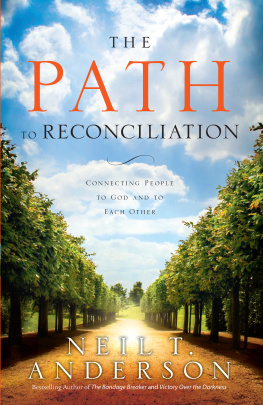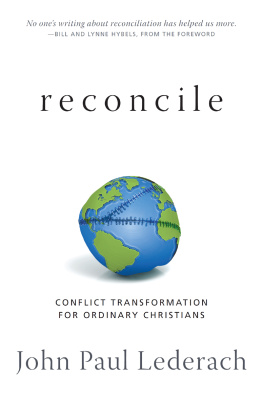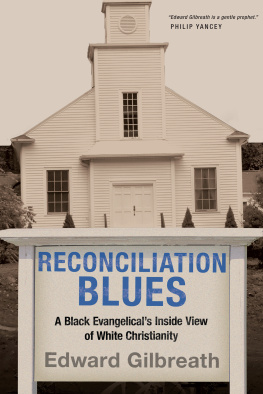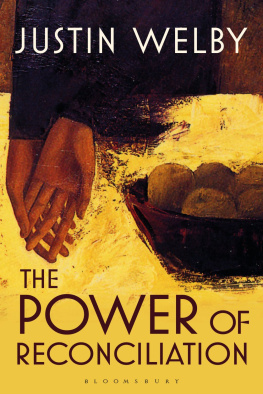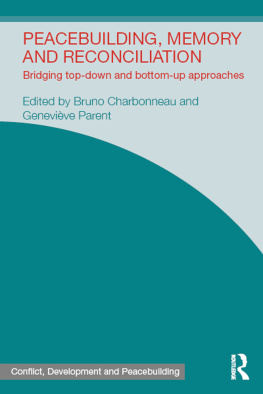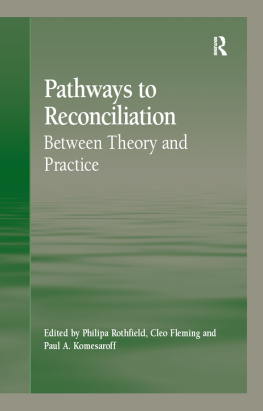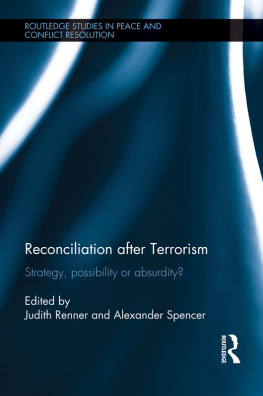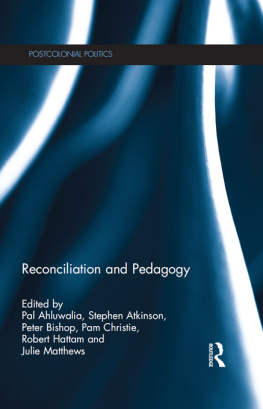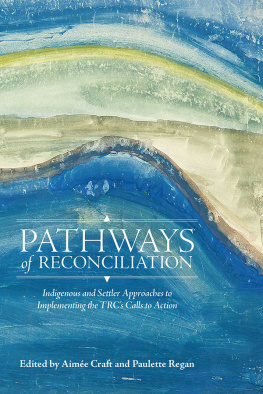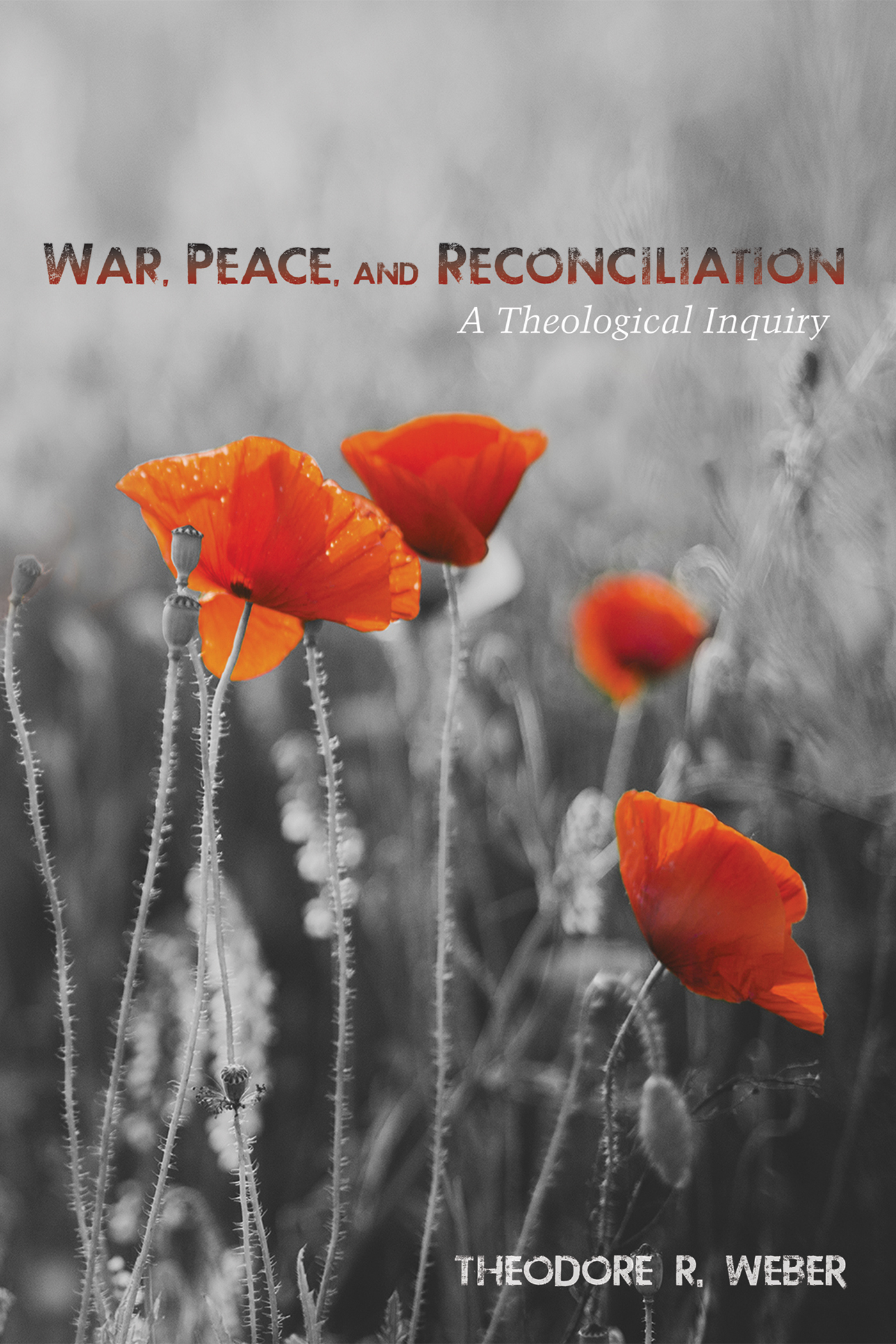War, Peace, and
Reconciliation
A Theological Inquiry
Theodore R. Weber

The Problem: How to Think as Christians about War and Peace
It is fun and inspiring to sing, Aint gonna study war no more! Regrettably it is no kind of guidance for Christian responsibility in the world. Christians are called to work for peace. To do that they must study warnot in order to make war, but to find out why it occurs and to learn how to bring its motives and energies under control. But first of all, to study war and peace they must discern the contours of reality disclosed by their Christian faith, and with that theological understanding begin to investigate the demands and challenges of war and the promises of peace. Note the order: First, establish the theological method and context. Second, armed with that knowledge make the inquiry into the political setting and historical occasion of war. That combination will constitute the study of warand demonstrate the paths to and prospects for peace.
A study of that sort was the idea supporting an international, indeed intercontinental, conference titled Theology, Politics, and Peace, held at Emory University and the Carter Presidential Center in Atlanta, Georgia, in April 1988 . The focus of the conference was a critical interaction among three Christian approaches to political understanding and peacemaking, each of them highly influential, and each originating on a different continent. Professor Jrgen Moltmann represented German political theology, Professor Jos Mguez Bonino spoke for Latin American liberation theology, and I was asked to interpret the American tradition of Christian Realism in relation to the other two positions.
The choice of political theology and liberation theology, and of their two representatives, was self-evident, given the contemporary prominence and influence both of the movements themselves and of their eminent and distinguished spokespersons. The inclusion of the American tradition of Christian Realism in a conversation with German political theology and Latin American liberation theology raised some eyebrows, mainly because many adherents of these other positions see itwhether rightly or wronglyas an ideological defender of the entrenched powers of which they are strenuous critics. For them, Reinhold Niebuhr is more likely the enemy than a theological ally. Nevertheless, the inclusion of this third position required no justification. Niebuhrs Christian Realism directly and substantively engages the problems of war and peacemaking, and does so from a Christian theological stance. It is an older theopolitical tradition than the other two. Mguez Bonino studied at Union Theological Seminary in New York when Reinhold Niebuhr was a faculty member there, and Moltmann reported that the first book he read of (what he called) dogmatic theology was Niebuhrs Nature and Destiny of Man .
However, this book is not a defense of Reinhold Niebuhr and Christian Realism, nor is it a continuing analysis and critique of the other positions represented. It is an exploration of the theology of reconciliation, showing how even war, with its massive destruction and unrelenting cruelty, is a proper object of reconciling ministry, and how the theology itself is developed and illuminated by this engagement. It expounds and demonstrates a particular Christian theological stance. It includes also a substantive investigation of the political context of war, of power as substantial and relational, of peace as an organization of power, of the historic transition from a European state system to a genuinely international system. As I stated earlier, first the theology, then the political analysis, with both essential in combination in any Christian thinking about war and peace. In these respects it remains within the purpose of the conference, which was to consider the interrelationships of theology, politics, and peace.
Preliminary Observations on Reconciliation
In a subsequent chapter I shall explore the meanings of reconciliation more fully. Here I want to offer some preliminary thoughts on what it is and is not. Reconciliation in the fundamental theological sense employed in this book is Gods workthe movement of divine grace through history, engaging all the aspects of brokenness and promise, and reaching its climax of fulfillment and disclosure in the life, death, and resurrection of Jesus Christ. It is the renewal of the fallen creation according to its original divine intention, the recovery of the human purpose of imaging God in caring for Gods creation, and of working cooperatively in doing so. With this grand coverage it includes the conflicts of nations, which are aspects of the fallen creation and manifestations of its disruption.
Reconciliation, explained thusly, is in its initiative and history Gods work, not primarily and essentially a human work. Nevertheless, it is alsoand in consequencea human work. Just as human beings were created by God to care for the garden, so too are they called by God to share in the work of recovering and renewing the same garden disrupted and spoiled by human sin. The special work of Christians is to disclose the existence and the power of this process, and to share in it. In point of faith, they know that in following their calling they are grounded and guided in this gracious history of God. Just what kind and degree of reconciliation they can achieve are problems to be worked through in this book.
At this point, let us attempt some further clarifications. First, reconciliation is a corporate concept before it is an individualistic or interpersonal concept. Primarily that is because Gods work of healing and recovery is for the whole of the fallen creation, not just for individual persons or their fractured relationships. In both its divine and human dimensions it is a community-building enterprise, striving toward the realization of what Martin Luther King Jr. called the beloved community. But also it recognizes the social nature of human beingsthey are persons emergent and embedded in social institutions and groups, and often defined by them. Those who reach out to each other from divergent social locations never are fully empowered to be reconciled until the effects of these societal barriers are overcome. Hence the necessity of defining reconciliation primarily (but not exclusively) in terms of societal transformation and inclusiveness.
Second, theologically guided reconciliation is a matter of contextual discernment, not of method. Methods of encounter and transformation certainly are important, but they are not fundamental to the vocation of reconciliation. When Saddam Hussein invaded Kuwait in 1990 and threatened Saudi Arabia, the United States and its gathered allies made plans to expel the Iraqis by military force. At that time, a group of persons of Christian inspiration offered a counterproposal: Let us try reconciliation, they urged, not war. I had serious doubts as to the adequacy of their political analysis, but I was troubled even more by their theology. Their proposal was to try reconciliation , which implied that reconciliation is a technique or procedurepresumably nonviolentthat holds unusual promise of greater effectiveness in resolving the conflict in a truly constructive and healing manner, but is not yet recognized for its relevance to the problem being addressed by material and damaging forms of power. Viewed thusly, reconciliation is a sometime thing, a religious specialty, left out of usual deliberations and brought in only when things get really badand seem probably hopeless. Moreover, given this understanding, it is the specifically Christian way to engage the threatening and destructive realities of war.


